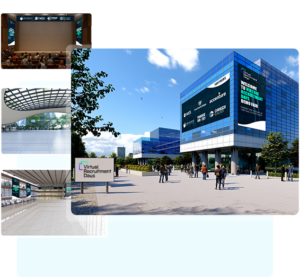There is no denying the value and impact of virtual events. In times of uncertainty, virtual events have greatly benefitted event organizers. The scalable solutions, insightful reports and immersive experience together help create impressionable events. However, in the post-pandemic era, event organizers faced many challenges in the wake of hosting virtual events. It comes with its share of complications that keeps events organizers tip-toeing throughout the process. From setting up the virtual event to executing it perfectly, a lot of homework is involved. Let us consider the main event challenges faced when hosting a virtual event and critically discuss the possible solutions to our problems.
1- Absence of Content Strategy
When hosting a virtual event for the first time, the absence of a sound content strategy could easily bring you down. Like, not having heads up on event segments might confuse people attending the event for the first time. It might let them astray and distract them from the sole purpose of attending the event. This in itself is a loss for you and your attendees. For that matter, the event organizers must plan out the event in terms of sessions, speakers, data and digestible content.
Determining Content for Virtual Events
Firstly, schedule the event segments, duration and materials to offer a wholesome experience to the audience. Make sure your audience is guided and entertained throughout their login sessions. In fact, do everything possible to save your audience from distractions. For example, a demo may save the audience from any surprises at your virtual job fair.
Webinars are the backbone of virtual events. You must plan the webinar sessions carefully with informative content, speaker sessions and engagement segments. But, make sure the sessions must not exceed from 20minutes time as it might bore your audience. Meanwhile, you can encourage participant interactions with live polling, quizzes and Q&A sessions. Also, use alerts and notifications to keep them running, like setting up reminders for attendees to finish their training programs.
2- Declining Attendee Turn-out
One of the biggest event challenges recorded today is the declining attendee turnout. Getting people to register for events and attend is the first step to securing a digital footprint. Compared to physical events, virtual attendance is scored with great effort. It raises concerns like:
- How would you reach your target audience online?
- What helps score maximized registrations?
- How would you tap the global audience?
The number of attendees for your virtual recruitment event is determined by the uproar created in the marketplace. For instance, the more people talk about your event, the more attendance is assured. So communicate what’s in it for them and watch a global audience roll in. For starters, it is important to develop a solid pre-event marketing strategy. So sit down to curate an effective marketing campaign that would work best for you.
Steps to Maximizing Attendee Count
- Use social media platforms to share a convincing message with the target audience.
- Open the registrations portal as early as three weeks prior to the event
- Once you have secured registrations, it is better to reach them first-hand via email.
- Schedule pre-event email marketing campaigns to ensure maximized attendance
- Influence the target audience by communicating highlights of your event
- Use website, networking channels, partner agencies, and digital media to post ads
- Get keynote speakers and guests to share links to the registration page
3- Threats to Safety and Security
Security is a major concern for event organizers when it comes to hosting virtual events. The concerns about cyber-attacks and breaches of information crawl up the minds soon as the event is set up. Generally, the major security threats are; viruses, malware, threat attacks and unauthorized event access.
Virtual Platform to the Rescue
Today, the virtual events platform software comes with end-to-end encrypted security. For instance, the platform secures attendee profile information and entire event statistics to offer you a carefree experience. However, it is suggested to partner with a platform that offers complete cyber hygiene. The platform should offer security in terms of:
- Built-in metrics to track unauthorized access within the event.
- Using the right tech and tools to ensure smooth platform functioning
- Secure attendee profile information
- Ability to track cybercriminals accessing the data
- Run multiple security checks prior to the event going live
Your event is a hit when all the backend and front-end security concerns are well addressed.
4- Lack of Attendee Engagement
Compared to an in-person gathering, online attendee engagement is a great event challenge for event planners. Like, managing a global audience all at once is surely a daunting task. Also, there is an increased risk of distractions when attending the event from home. Thus, it is important to follow a detailed attendee engagement plan from registration to checkout.
Virtual Event Engagement Opportunities
Interestingly, virtual platforms offer tons of networking and engagement opportunities for the audience. It helps a global audience benefit from the live chat and meeting scheduler options. Moreover, the platform becomes your unified communications as a service platform, facilitating 1:1 and group interactions. So in order to keep the attendee interested and engaged throughout the event, certain dos must be practiced.
- Install event navigational buttons to help attendees navigate independently
- Attend to attendee queries at the reception desk
- Involve attendees in live booth polls, quizzes and Q&As
- Allow live networking with peers through chat options
- Offer a meeting scheduler option to connect with speakers or hosts
- Use alerts and notifications to guide attendees on the go
- Offer gifts, prizes and goodies to reinforce attendees
5- Absence of Technical Assistance
There are many technicalities involved in setting up a virtual event. From interrupted internet connection to software limitations, the technical aspects of your virtual presence demand careful attention. Sometimes, the attendees have a hard time understanding the platform and self-navigating through the event. Also, you might face difficulty understanding the software and customizing the experience for your audience. Here, the absence of technical support could force it all down the drain. So how would you handle the technical aspects?
Ways to Overcome
With the right assistance from the support team, event organizers manage to pull off a successful fair. First off, partner with a virtual platform that offers complete technical support. The support team must be available to assist you or the attendees to sift through the platform easily.
Tip: Keep your virtual event easy to follow. Do not complicate the functionalities of the event, as it might confuse your audience.
Final Thoughts
Virtual Days offer a comprehensive guide to overcoming event challenges in the wake of hosting virtual events. The platform itself is designed to save you from getting tangled in the hurdles. For instance, VRD offers expert technical support and end-to-end security to easily host a virtual event. In fact, our platform becomes your digital hub for attracting global talent and engaging them in the best possible ways.
Request a demo today and discuss the way out of event challenges that might weigh you down.






